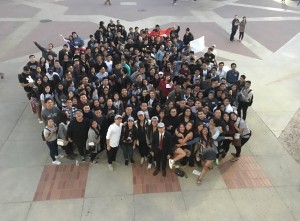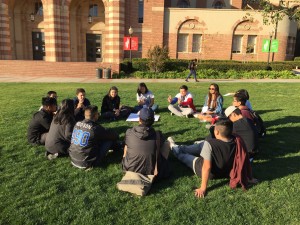Fil-Am students gather to learn about Filipino culture, identity

SCPASA Summit attendees (students from different Filipino American organizations across Southern California). MARJIE PANKNIN PHOTO
LOS ANGELES — More than 400 college students from various Filipino American organizations on February 20 attended the ninth annual Southern California Pilipino American Student Alliance Summit, also known as SCPASA Summit, at University of California-Los Angeles (UCLA), to tackle issues surrounding Filipino culture.
The annual student-run conference’s theme “Illustrate” encouraged college students to learn cultural expression via different outlets, as well as to know people who share common concerns.
Kayamanan Ng Lahi, the Los Angeles-based dance troupe which was this year’s summit keynote performer, serenaded the summit attendees to show the importance of Filipino culture.
Keynote speakers were Los Angeles Board of Public Works Commissioner Joel Jacinto and Ancient Arts cultural practitioner Lane Wilcken.
Numerous workshops held throughout the day presented opportunities for understanding the theme “Illustrate” as well as perspectives on Filipino American culture.

Summit participants in small group discussion, sharing their ideas and interests regarding Filipino American culture. CHRISTIAN ESTEBAN PHOTO
“We chose [the theme] because we believe the college students need to define what culture is and encourage them to use it [culture] for the next generation of Filipino Americans,” explained Zach Chaco, SCPASA chairperson from University of Southern California (USC). “We are trying to give students the tools of understanding. Expression comes in all different forms because it is part of our existence,” Chaco said.
Pau Valdez, one of the summit “funcilitators” and a sophomore from Loyola Marymount University (LMU), attended the summit “to learn my own cultural identity, to share with other people.”
“Illustrate is not about being able to take in culture, but be able to reciprocate and let it out in your own specific way, such as dancing, language and dialogue of everyone,” Valdez said.
Topics covered for this year’s summit were Filipino American culture and the role of education, Asian American mental health, culture as a form of self-expression, among others.














